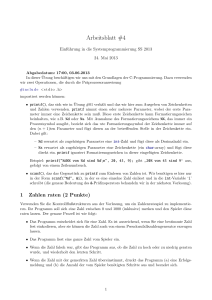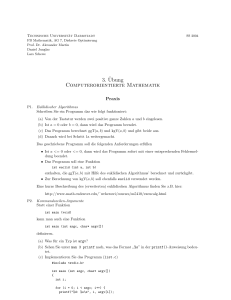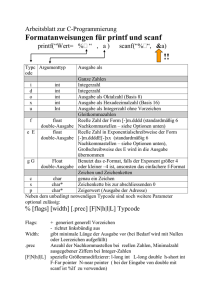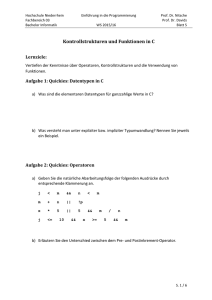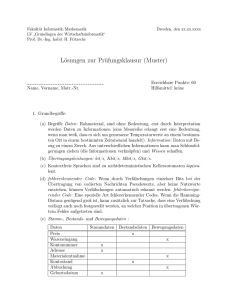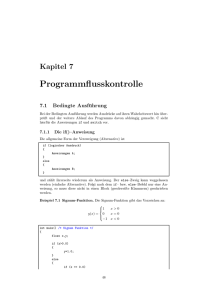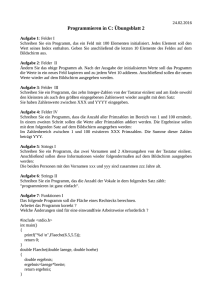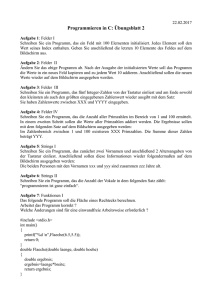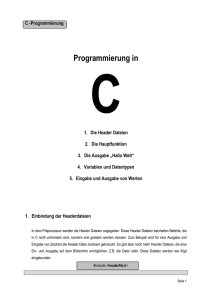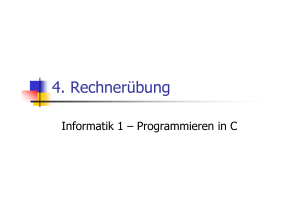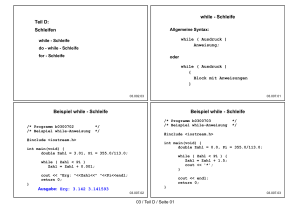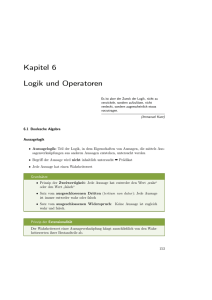Informatik B, Sommer 1997
Werbung
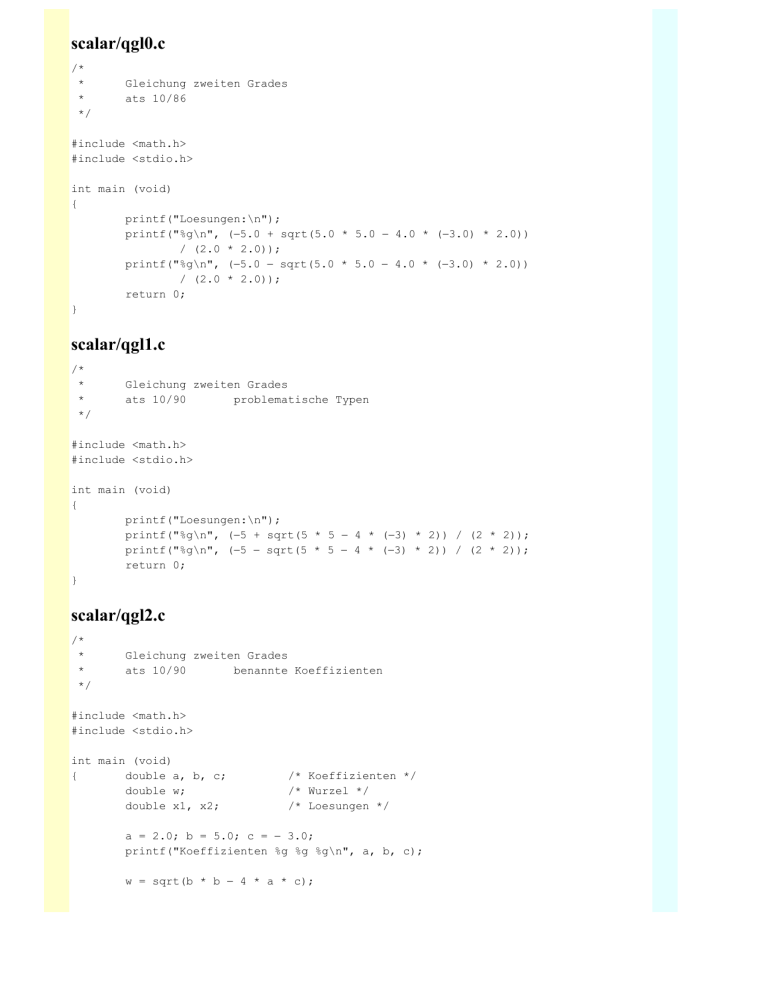
scalar/qgl0.c
/*
*
*
*/
Gleichung zweiten Grades
ats 10/86
#include <math.h>
#include <stdio.h>
int main (void)
{
printf("Loesungen:\n");
printf("%g\n", (−5.0 + sqrt(5.0 * 5.0 − 4.0 * (−3.0) * 2.0))
/ (2.0 * 2.0));
printf("%g\n", (−5.0 − sqrt(5.0 * 5.0 − 4.0 * (−3.0) * 2.0))
/ (2.0 * 2.0));
return 0;
}
scalar/qgl1.c
/*
*
*
*/
Gleichung zweiten Grades
ats 10/90
problematische Typen
#include <math.h>
#include <stdio.h>
int main (void)
{
printf("Loesungen:\n");
printf("%g\n", (−5 + sqrt(5 * 5 − 4 * (−3) * 2)) / (2 * 2));
printf("%g\n", (−5 − sqrt(5 * 5 − 4 * (−3) * 2)) / (2 * 2));
return 0;
}
scalar/qgl2.c
/*
*
*
*/
Gleichung zweiten Grades
ats 10/90
benannte Koeffizienten
#include <math.h>
#include <stdio.h>
int main (void)
{
double a, b, c;
double w;
double x1, x2;
/* Koeffizienten */
/* Wurzel */
/* Loesungen */
a = 2.0; b = 5.0; c = − 3.0;
printf("Koeffizienten %g %g %g\n", a, b, c);
w = sqrt(b * b − 4 * a * c);
x1 = (−b + w) / (2 * a);
x2 = (−b − w) / (2 * a);
printf("Loesungen %g %g\n", x1, x2);
return 0;
}
scalar/qgl3.cc
/*
*
*
*/
Gleichung zweiten Grades
ats 10/90
Konstanten, C++ Definitionen
#include <math.h>
#include <stdio.h>
int main (void)
{
const double a = 2.0, b = 5.0, c = − 3.0;
printf("Koeffizienten %g %g %g\n", a, b, c);
const double w = sqrt(b * b − 4 * a * c);
const double x1 = (−b + w) / (2 * a);
const double x2 = (−b − w) / (2 * a);
printf("Loesungen %g %g\n", x1, x2);
return 0;
}
scalar/qgl4.c
/*
*
*
*/
Gleichung zweiten Grades
ats 10/90
mit Sonderfaellen
#include <math.h>
#include <stdio.h>
int main (void)
{
double a, b, c;
double d;
double x1, x2;
/* Koeffizienten */
/* Diskriminante */
/* Loesungen */
printf("Koeffizienten ? ");
scanf("%lf %lf %lf", & a, & b, & c);
d = b * b − 4 * a * c;
if (d < 0.0)
printf("Es gibt keine reellen Loesungen\n");
else
{
d = sqrt(d);
x1 = (−b + d) / (2 * a);
x2 = (−b − d) / (2 * a);
printf("Loesungen %g %g\n", x1, x2);
}
return d < 0.0;
/* 0: ok, 1: keine Loesungen */
}
scalar/qgl5.c
/*
*
*
*/
Gleichung zweiten Grades
ats 10/90
mit Koeffizienten aus der Kommandozeile
#include <math.h>
#include <stdio.h>
#include <stdlib.h>
/* sqrt */
/* atof */
int main (int argc, char * argv[])
{
double a, b, c;
/* Koeffizienten */
double d;
/* Diskriminante */
double x1, x2;
/* Loesungen */
if (argc < 4)
printf("Aufruf: %s a b c\n", argv[0]);
else
{
a = atof(argv[1]);
b = atof(argv[2]);
c = atof(argv[3]);
printf("Koeffizienten %g %g %g\n", a, b, c);
d = b * b − 4 * a * c;
if (d < 0.0)
printf("Es gibt keine reellen Loesungen\n");
else
{
d = sqrt(d);
x1 = (−b + d) / (2 * a);
x2 = (−b − d) / (2 * a);
printf("Loesungen %g %g\n", x1, x2);
return 0;
}
}
return 1;
}
scalar/newton.c
/*
*
*
*/
Quadratwurzel mit Newton Verfahren
ats 10/90
#include <stdio.h>
int main (void)
{
double A, t;
double w0, w1;
/* Argument, Fehler */
printf("Argument der Wurzel ? ");
scanf("%lf", & A);
printf("Fehlergrenze ? ");
scanf("%lf", & t);
w1 = A;
do
{
w0 = w1;
w1 = (w0 + A / w0) / 2.0;
} while (w0 − w1 > t);
printf("Wurzel: %g\n", w1);
printf("Quadrat: %g\n", w1 * w1);
return 0;
}
scalar/euklid0.c
/*
*
*
*/
Euklid’s Algorithmus −− groesster gemeinsamer Teiler
ats 10/90
#include <stdio.h>
int main (void)
{
int x, y;
scanf("%d %d", & x, & y);
printf("ggT(%d, %d) == ", x, y);
while (x != y)
if (x > y)
x = x − y;
else
y = y − x;
printf("%d\n", x);
return 0;
}
scalar/euklid1.c
/*
*
*
*/
Euklid’s Algorithmus −− groesster gemeinsamer Teiler
ats 10/90
robustere Eingabe
#include <stdio.h>
int main (void)
{
int x, y;
while (1)
{
printf("Bitte zwei Zahlen eingeben: ");
if (scanf("%d %d", & x, & y) < 2)
break;
if (x <= 0 || y <= 0)
printf("beide muessen positiv sein\n");
else
{
printf("ggT(%d, %d) == ", x, y);
while (x != y)
if (x > y)
x = x − y;
else
y = y − x;
printf("%d\n", x);
}
}
return 0;
}
scalar/euklid2.c
/*
*
*
*/
Euklid’s Algorithmus −− groesster gemeinsamer Teiler
ats 10/90
rekursive Loesung fuer Kommandoargumente
#include <stdio.h>
#include <stdlib.h>
/* atoi */
int ggT (int x, int y)
{
if (x == y)
return x;
if (x > y)
return ggT(x−y, y);
return ggT(x, y−x);
}
int main (int argc, char * argv[])
{
int x, y;
if (argc < 3)
return printf("Aufruf: %s x y\n", argv[0]);
x = atoi(argv[1]);
y = atoi(argv[2]);
if (x <= 0 || y <= 0)
return printf("Zahlen muessen positiv sein\n");
printf("ggT(%d, %d) == %d\n", x, y, ggT(x, y));
return 0;
}
scalar/int0.c
/*
*
*
*/
Groesse einer Integer
ats 10/90
#include <stdio.h>
int main (void)
{
int i, j = 1;
do
{
i = j;
j = i << 1 | 1;
} while (j > i);
printf("max: %d, ", i);
do
{
i = j;
j = i << 1;
} while (j < i);
printf("min: %d\n", i);
return 0;
}
scalar/int1.c
/*
*
*
*/
Groesse einer Integer
ats 10/90
unsigned
#include <stdio.h>
int main (void)
{
unsigned i, j = 1;
do
i = j, j = i << 1 | 1;
while (j > i);
printf("max: %u, ", i);
if (i == j)
i = 0;
else
do
i = j, j = i << 1;
while (j < i);
printf("min: %d\n", i);
return 0;
}
scalar/int2.c
/*
*
*
*/
Groesse einer Integer
ats 10/90
fuer alle Typen mit C Preprozessor
#include <stdio.h>
#define TEST(INTEGER)
{
INTEGER i, j = 1;
printf("%−20s", #INTEGER ":");
do
i = j, j = i << 1 | 1;
while (j > i);
printf("max: %lu, ", (unsigned long) i);
if (i == j)
i = 0;
else
do
i = j, j = i << 1;
while (j < i);
printf("min: %ld\n", (long) i);
}
int main (void)
{
TEST(char);
TEST(unsigned char);
TEST(signed char);
TEST(short);
TEST(unsigned short);
TEST(int);
TEST(unsigned);
TEST(long);
TEST(unsigned long);
return 0;
}
\
\
\
\
\
\
\
\
\
\
\
\
\
\
\
\
\
\
\
scalar/int3.c
/*
*
*
*/
Groesse einer Integer
ats 10/90
ohne Schleifen
#include <stdio.h>
#define max(type, utype)
((type) ˜0L > 0 ? (type) ˜0L : (utype) ˜0L >> 1)
\
#define min(type, utype)
((type) ˜0L > 0 ? 0 : (type) ˜ ((utype) ˜0L >> 1))
\
#define TEST(type, utype)
\
printf("%−20smax: %lu, min: %ld\n", #type ":",
\
(unsigned long) max(type, utype), (long) min(type, utype))
int main (void)
{
TEST(char, unsigned char);
TEST(unsigned char, unsigned char);
TEST(signed char, unsigned char);
TEST(short, unsigned short);
TEST(unsigned short, unsigned short);
TEST(int, unsigned);
TEST(unsigned, unsigned);
TEST(long, unsigned long);
TEST(unsigned long, unsigned long);
return 0;
}
